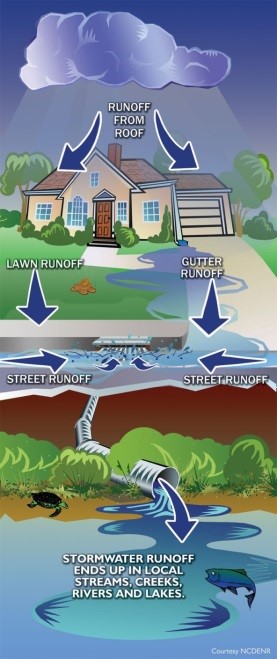Runoff
Runoff is water that travels over land, roadways, sidewalks and buildings,
and flows to a stream, river or lake. It can be caused by rain, snow melting,
and water used for irrigation of farmersâ�fields, residential lawns, sports
fields, and golf courses. Many different kinds of pollutants can be carried by
water running off these surfaces. These include fertilizers, pesticides, oil,
grease, animal waste, cigarette butts, and trash. It can also carry soil from
construction sites and farmer’s fields which is called sediment.
Runoff that comes from weather events is known as stormwater. Pollutants carried
by stormwater are known as Nonpoint Source Pollution, since we have no idea where
it comes from. Nonpoint Source Pollution enters our streams when stormwater goes
down storm drains in our streets. With the ever increasing pressures of development,
pollution from stormwater runoff has become a major concern for the Metedeconk River
Watershed and the Barnegat Bay Estuary.
Nutrients from fertilizer and animal waste in the form of nitrogen and phosphorus and
their various compounds can cause major problems for freshwater and saltwater ecosystems.
Both contribute to algal blooms within them. When large amounts of algae die, it depletes
the dissolved oxygen in the water that fish and other aquatic organisms need to survive.
Once their oxygen source is gone, they cannot live. This process is called eutrophication.
By using methods to control nonpoint source pollution, we can decrease the amount of
pollutants entering our waterways. Such methods include rain gardens, porous pavement,
bioretention basins, and rain barrels. Many of these contain native plants and soil mixtures
that can â�b>treatâ�stormwater, while others prevent excess water from running off our yards into
our streams. These methods are also known as green infrastructure. To learn more about green
infrastructure, please visit our page on this topic.
To learn more about runoff, please visit The USGS Water Science School at https://water.usgs.gov/edu/runoff.html.



